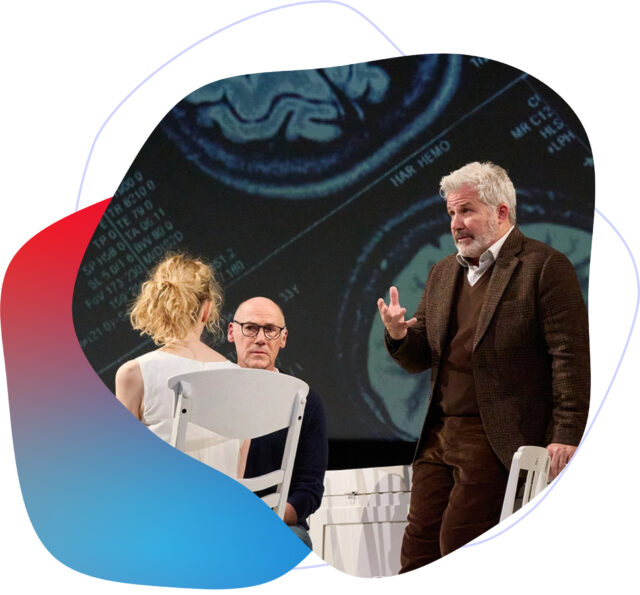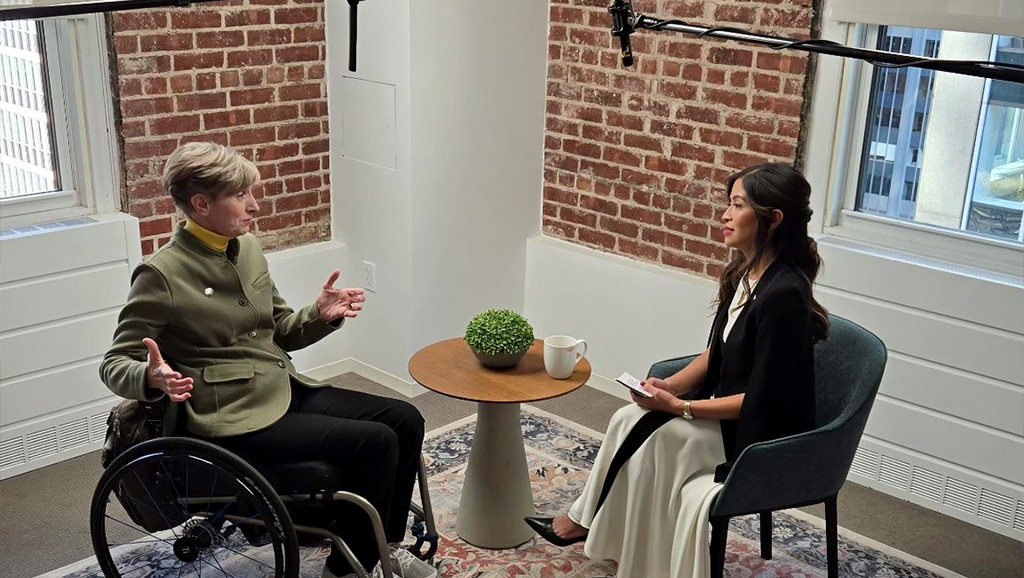Our Work
Dana Frontiers

Increasing Public Engagement with Neuroscience
The Dana Frontiers program supports multidirectional engagement to collaboratively identify and address key issues at the intersection of neuroscience and society. We support projects that build meaningful relationships between the many communities of people involved in neuroscience. These communities may include patient groups, technology end-users and developers, clinicians, researchers, ethicists, regulators, policymakers, as well as public audiences and others. Frontiers-supported projects ensure these different perspectives shape neuroscience research and relevant policies. By supporting multidirectional engagement in neuroscience, the Frontiers program ultimately aims to build capacity for communities and organizations to collaboratively respond to societal challenges and opportunities related to neuroscience.
The Frontiers grant portfolio includes the development of engagement tools and resources, novel engagement approaches, and support for leadership in multidirectional engagement in neuroscience. This could include new tools for trust-building and deep listening with communities, creating new opportunities for community collaboration across sectors and identities, and support for leaders who champion effective models of neuroscience engagement.
FAQs for Grant Seekers
What is neuroscience and society? Is it the same as neuroethics, bioethics, or science and technology studies? Does my work fit?
Neuroscience and society is the interdisciplinary study of how neuroscience informs and reflects society, and practical work to put these ideas into action. Neuroscience and society includes fields where neuroscience interfaces with the world, such as ethics, law, humanities, medicine, arts, social sciences, policy, education, journalism, and public engagement. This list is meant to be illustrative, not exhaustive. Other disciplines may fall within the purview of neuroscience and society.
While neuroscience and society is not the same as neuroethics, bioethics, or science and technology studies, there are areas of overlap.
Another way we think about it: Neuroscience & society is a paradigm for how we can teach neuroscience to people, train people to do societally relevant neuroscience-focused work, and engage diverse communities of people to shepherd the development and application of neuroscience.
For further information, please visit our Neuroscience and Society page. Applicants are encouraged to contact the Foundation if they have questions.
What does the Dana Foundation fund?
The Dana Foundation is a nonprofit grantmaking institution that works to advance neuroscience that benefits society and reflects the aspirations of all people. Grant applications are made to a particular program. Interested applicants should read through the Foundation’s program descriptions in the Our Work section of the website carefully. Each program page includes a statement of the program’s goal and objectives, a list of recent grants, and a section with information on how to apply. Prospective applicants are encouraged to explore the grants awarded within a program to gain insight into the types of projects supported. The majority of our grants are up to $150,000 in total funding for a project period of 12-18 months.
At this time, the Foundation will not provide funding for indirect costs as part of our grantmaking process, unless otherwise specified.
What does the Dana Frontiers program not fund?
Specific to the Dana Frontiers program, we are not interested in funding:
- Projects that primarily aim to increase awareness about brain health or specific brain-based diseases. (See Brain Awareness Week grants)
- Projects that primarily aim to remedy a perceived “knowledge deficit” in communities and public audiences without creating multidirectional relationships, fostering mutual learning, or collaboration.
- Research projects that draw on community input only to improve recruitment, participation, or shaping research questions, practices, or outcomes, without building genuine partnerships that directly benefit communities.
- Projects that primarily produce static deliverables such as reports or websites without developing them in partnership with the communities they intend to serve.
- Performances, art, films, or exhibits, except as part of larger sustained, multidirectional and collaborative community engagement.
- Projects focused only on engagement among academics or experts, unless they also build skills, resources, capacity, or opportunities for connection with non-scientific communities.
For expanded terms, conditions, and policies, please see our General Grant Guidelines.
I would like more information about the Foundation’s program areas. Who should I contact?
Visit our Contact Us section to reach the program area of choice, or visit our staff page to email a program staff member directly. To receive occasional notifications about our funding opportunities, subscribe to our Grants Email Alerts.
I’m not sure my area of work fits under the Foundation’s program areas. Who should I contact?
Interested applicants should carefully read through the Foundation’s program descriptions before contacting us. To connect with a program staff member about innovative ideas that align with our programmatic goals and objectives, please visit our Contact Us section and select the program area of choice. We generally do not respond to funding inquiries distinctly outside our domain—Neuroscience & Society.
Who can apply to receive a grant?
Applicants must be designated as a tax-exempt organization under the provisions of 501(c)(3) of the United States Internal Revenue Code to be eligible for a grant.
Please note:
- The Foundation does not make grants to political campaigns, to support political activities, or to lobby for or against legislation.
- The Foundation does not make grants to individuals.
- The Foundation does not generally make grants to for-profit institutions.
- Organizations must be able to provide an EIN number and additional financial and/or tax documentation to support their proposals.
Applicants are also encouraged to review the Foundation’s terms and conditions.
Does the Dana Foundation award grants outside of the US?
The Dana Foundation currently provides international funding for neuroscience and society through our partnerships with FENS and IBRO in the form of Brain Awareness Week grants. Beyond these programs, our grant-making is focused domestically, but we will consider applications from organizations outside of the US on a case-by-case basis.
If you are located outside of the US and have a project idea that you believe would strengthen neuroscience’s positive role in the world in alignment with our mission, vision, and values, please send an inquiry on our Contact Us page, selecting the program topic that most closely aligns with your project idea.

